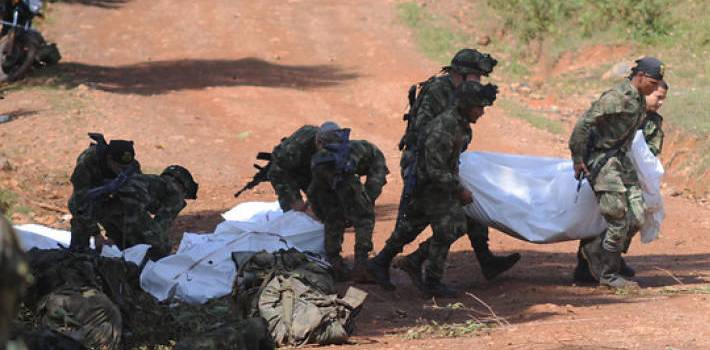
EspañolReaching a peace agreement with the FARC Marxist guerrilla, after 50 years of conflict, remains one of the chief aspirations of the majority of Colombian citizens. But now, after two years of peace talks in Havana, Cuba, skepticism about an eventual winding-down of the violence is fast becoming widespread.
Colombians are increasingly doubtful as to whether negotiations will bear lasting fruit, as documented by Juan David Cárdenas. He is coordinating an investigation by La Sabana University, which examines the hopes and perspectives of Bogotá residents concerning the peace process.
“The majority of public opinion is uncertain about the government-FARC negotiations, and this is serious, because if this continues, they’re not going to ratify by referendum the preliminary agreements reached in Havana,” the analyst explains.
“The policy by the government and rebels has been ‘we’ll arrange this among ourselves,’ and as a result ordinary people don’t know whether they’re in favor or against. The issue has been handled very much in secret, and when they make statements they’re very preliminary. The communication is so ambiguous that even what the opposition thinks is very speculative,” Cárdenas adds.
The talks have dragged on longer than planned, leading to moments of uncertainty witnessed in other post-conflict contexts around the world. Nevertheless, the current moment is crucial, as perceived gains around the negotiating table appear to have been left behind with the renewed outbreak of violence in May.
“They’ve achieved three important things: to a certain extent, there was an implicit bilateral ceasefire which could have been read as a kind of truce. After the rupture of this truce, the indexes of credibility in the peace process fell to very low levels, never seen before,” the professor explains. “They’re trying to reach an agreement in this context, while the process is marked by difficulties, which generate a lot of doubts among citizens.”

This, Cárdenas argues, risks the process of approval by referendum that any peace deal will eventually have to submit to.
It also makes the opposition, led by former President Álvaro Uribe Vélez, less likely to back the peace negotiations. His “hard line” on battling the FARC during his two successive administrations (2002-2010) played a key role in wearing down the guerrilla and bringing them to the negotiating table.
Retired General Jaime Ruiz, director of retired military officers’ association ACORE, told the PanAm Post that “we’re not seeing genuine will by the FARC to reach a deal, due the radical positions they’ve taken against the peace process.”
“It’s absolutely certain that they didn’t comply with the ceasefire they announced. Nor is it the first time they haven’t complied with it; on other occasions the same thing has happened and later we see armed activities against the civilian population and members of the armed forces,” Ruiz adds.
For and Against
In his investigation, Cárdenas has found that residents of the capital, at least, strongly support the reintegration of the guerrilla into civilian life, but reject the participation of former rebels in national politics.
“Here there’s the first contradiction that has to do with how they’ve communicated and legitimized the process. If we suppose that we’re in a political negotiation, and what these people want to do is return to society and take part in politics, but the people don’t want that, it’s a problem that won’t be solved by reaching an agreement.”
Another controversial issue is that people are not disposed to forgiving the guerrilla, in part because they doubt the legitimacy of Colombian justice.
Running Battles
The unilateral ceasefire declared by FARC in December 2014 ended after an army attack in the municipality of Guapí, Cauca Department, in which 26 guerrilla were killed — among them alias “Jairo Martínez,” one of the rebel group’s chief negotiators in Havana.
The Cauca attack was itself a response to a guerrilla ambush that killed 11 soldiers while they slept, prompting the government to begin aerial bombardments which it had previously suspended.
Last Wednesday, June 3, news emerged that FARC had carried out six attacks in the municipality of Tumaco, Nariño Department, including one on an ambulance. The 37th cycle of talks between FARC and the government meanwhile ended on Thursday without any announcement of concrete agreements.
They need to accelerate the pace of negotiations before another government comes to power.
“It’s undeniable that the military offensive against the FARC, and the change of state strategy to finish off the guerrilla during the two Uribe administrations, weakened it dramatically,” says Eduardo Álvarez, coordinator of research into conflict and negotiations dynamics for the Ideas for Peace Foundation.
“There’s been a qualitative change in terms of the geography of the war. In some areas of the country the numbers and military capacity of FARC has been substantially reduced, while in other regions such as Catatumbo, part of Arauca, and other border areas towards the south, the FARC maintains a tactical if not strategic capacity,” Álvarez explains.
“It’s military initiative has been totally decimated and the risks of it recovering are minimal,” the NGO researcher adds, drawing a contrast with the capacity of the group to carry out mass kidnappings in the late 1990s.
However, Álvarez doesn’t believe that the signing of a peace deal is “just around the corner. There are issues coming up which are critical for every peace process around the world. One of them is that of justice, which has to be designed by the whole country and meet with minimum international standards,” he notes.
Another is the model of disarmament, and guarantees for those demobilized protecting them from reprisals: “These are operational, sensitive issues which may seem straightforward, but over which the peace process could collapse.”
Two Steps Forward, One Step Back
“I don’t believe the process has been left behind, I just think that we’ve gone back to a previous situation … If one compares with the experience of other countries, this is part of negotiating in the middle of the conflict. When you’re doing it in these kind of circumstances what it means is that the negotiations become quicker and more efficient, because both sides realize that guerrilla and soldiers keep on dying, and there’s an obligation to solve the issue,” says Cárdenas.
Álvarez, however, strikes a cautious note. He emphasizes that “they need to accelerate the pace of negotiations so they can begin to implement the operational issues during the current government, because someone from the opposition could later come to power, and make the process lose its rhythm, or suspend it indefinitely.”
 Versión Español
Versión Español












